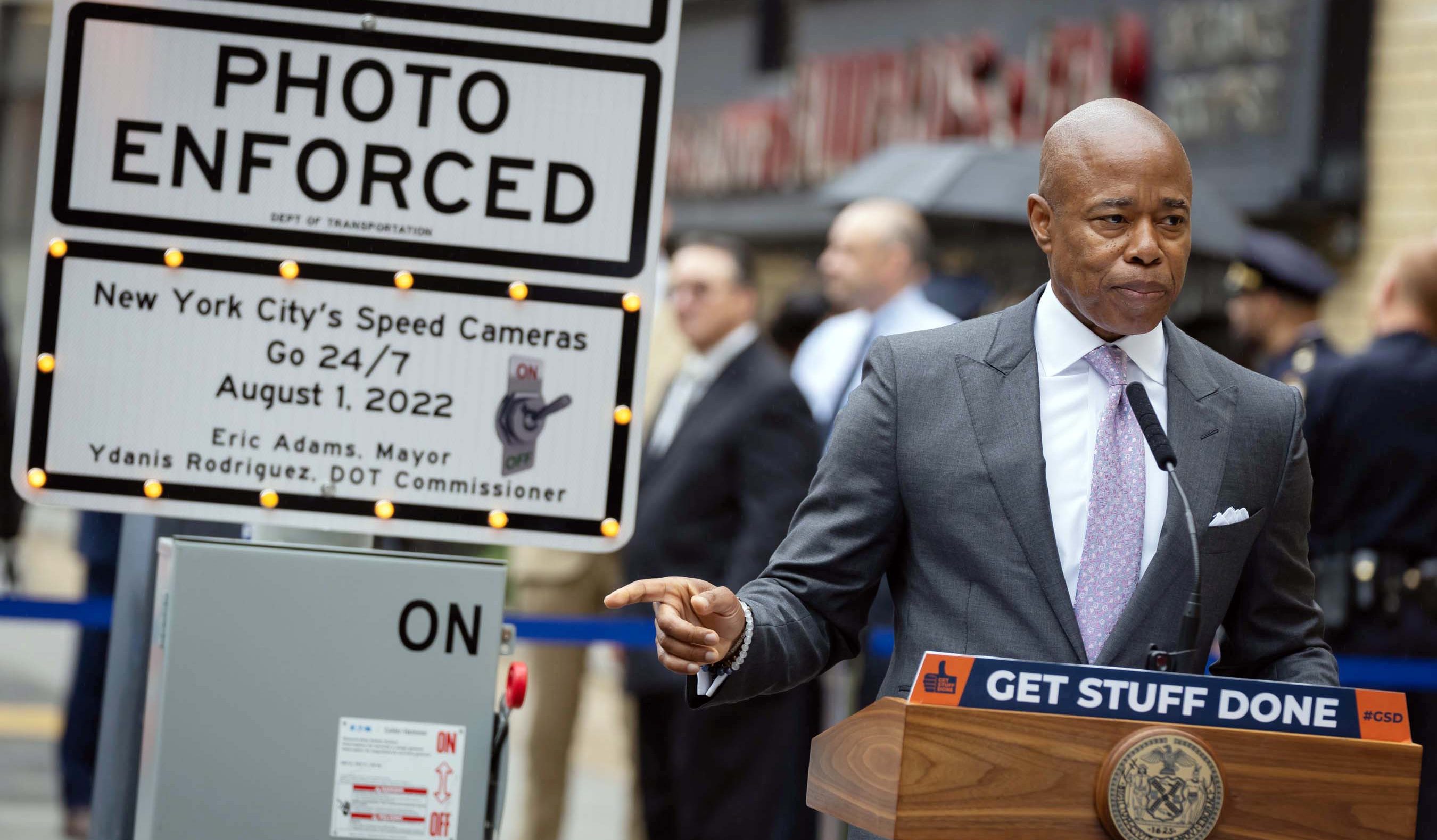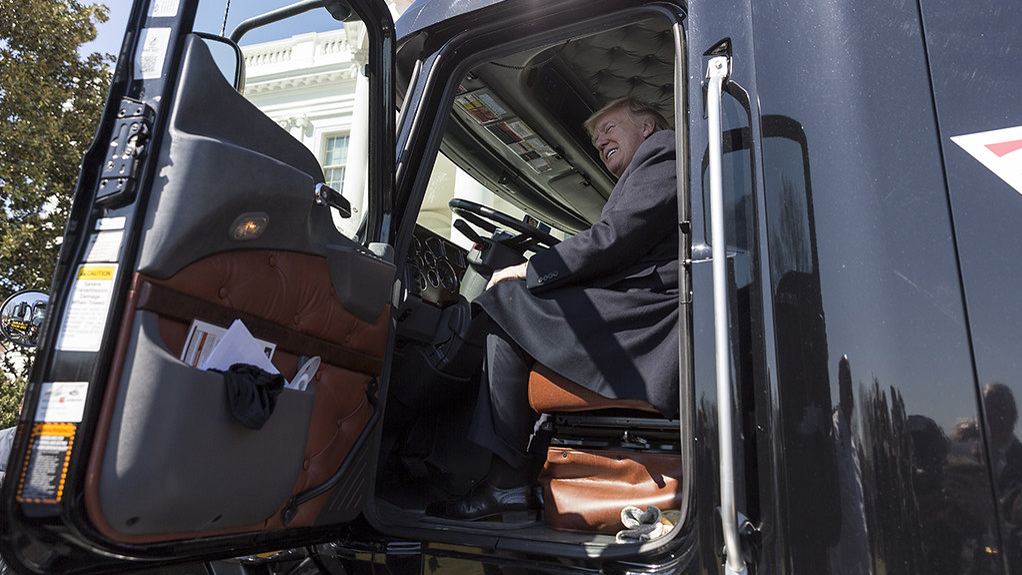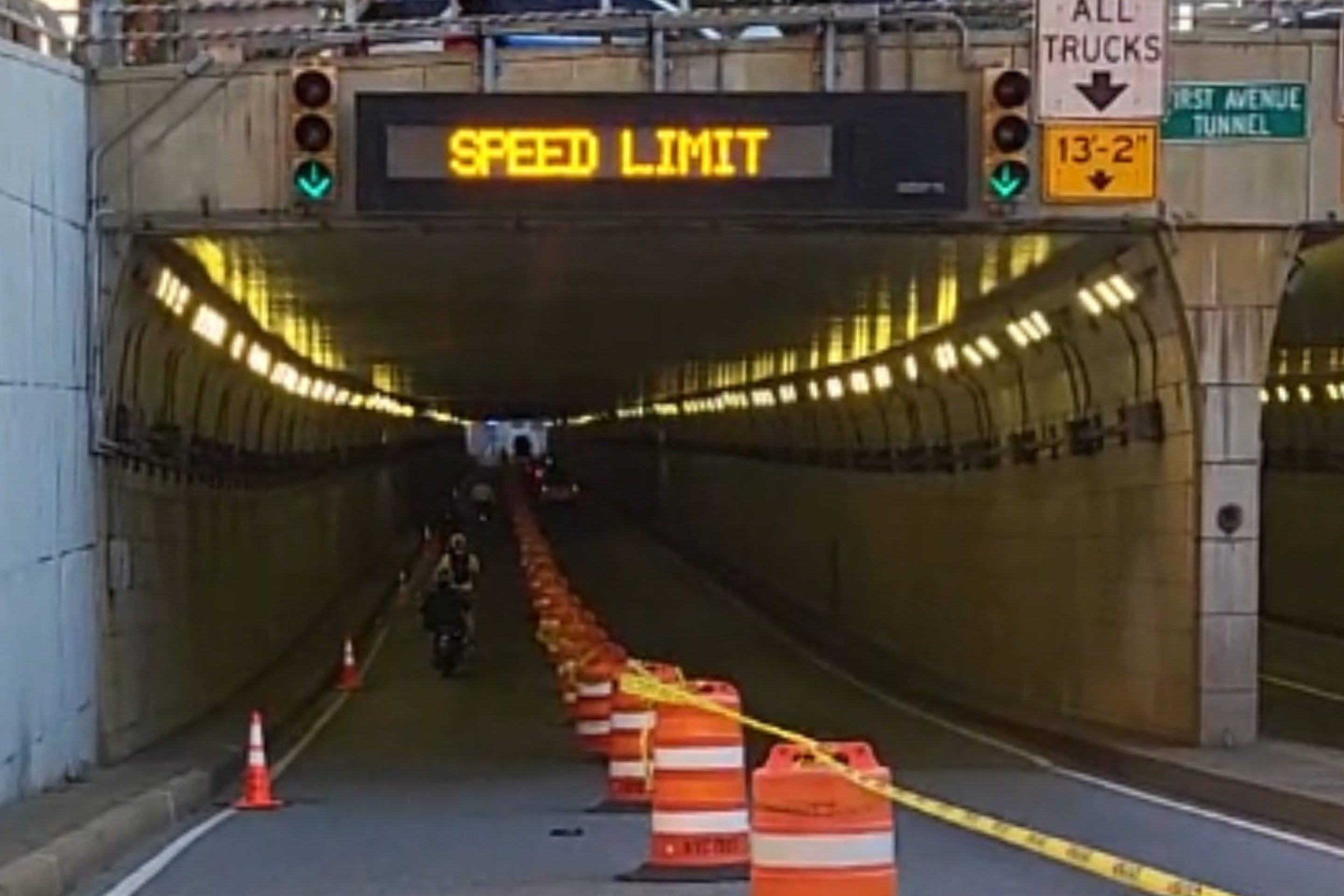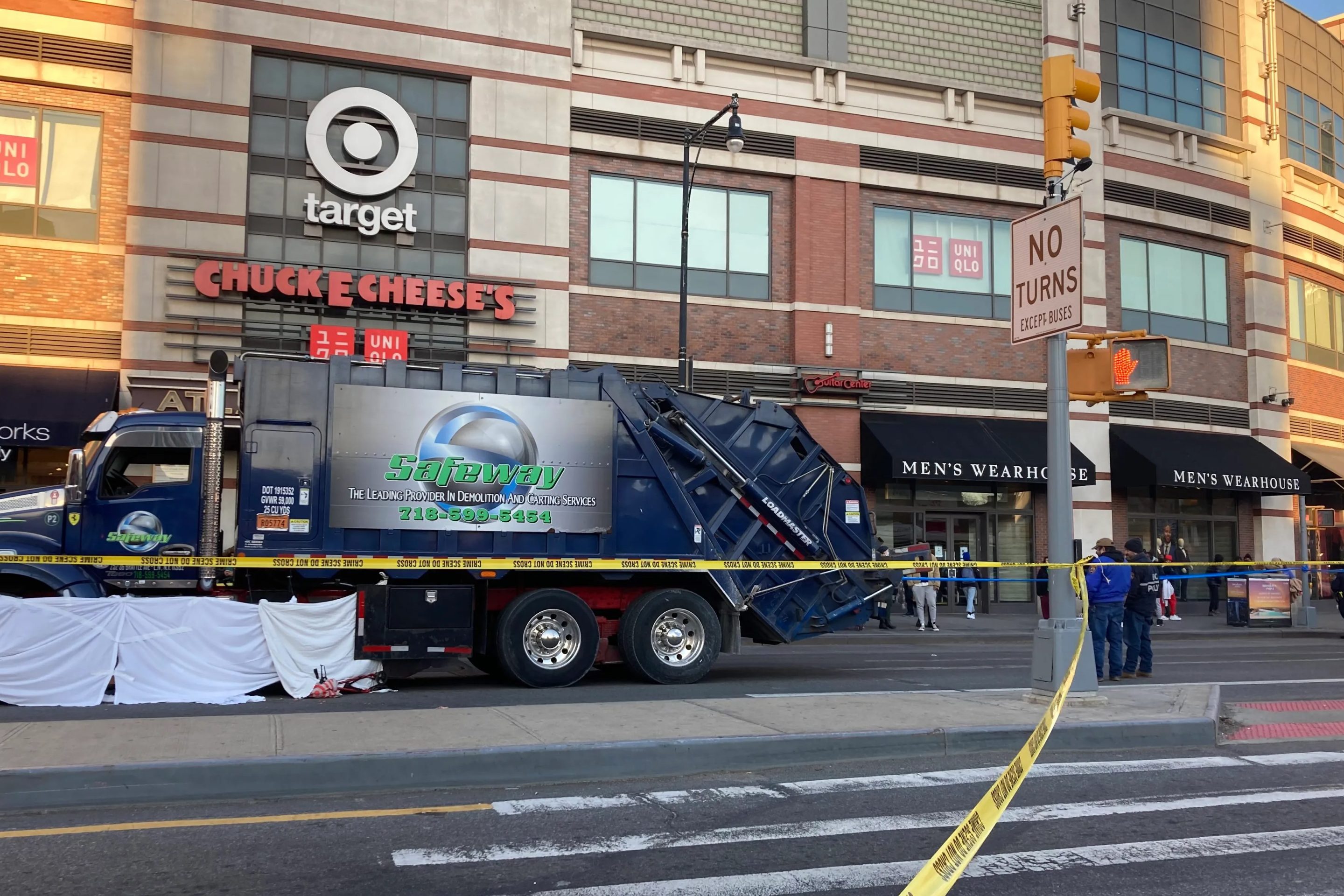DECISION 2021: Meet the Council Candidates, Brooklyn Edition (There are a LOT of Them!)
12:01 AM EST on January 4, 2021
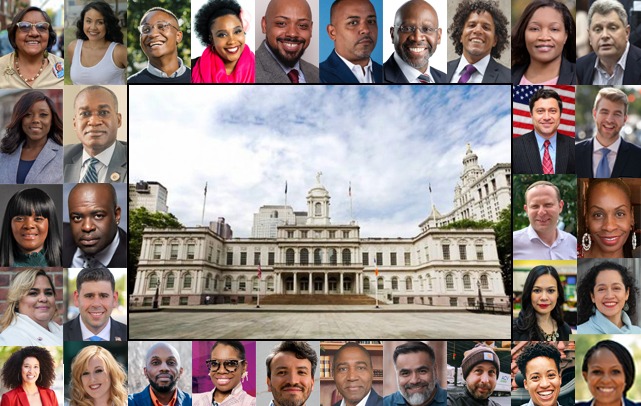
Just some (yes, some) of the candidates dozens of open Council seats.

This story, first published on Jan. 4, 2021, is periodically updated as candidates enter and leave the various races. The primary is on June 22, 2021.
There will be two transformational elections in 2021. The one you know about — the mayor's race — will give us new leadership at the top for the first time since 2014.
But the much more important election centers on the free-for-all for dozens of seats in the City Council — the first true turnover in the legislature in the post-term-limit era.
By our count, roughly three dozen out of 50 seats that will be on the June 22, 2021 ballot are up for grabs, often with multiple candidates. This is good for democracy.
The bad news? Advocates for livable streets want to believe that seven-plus years of Vision Zero, plus initial work by the Bloomberg administration a decade ago, has created a generational shift in thinking about street safety, public space, policing, cycling, pedestrian rights, and the selfishness and recklessness of drivers.
Well, in literally dozens of interviews conducted for this story — which is just a roundup of the 11 competitive Brooklyn races — we found that a vast portion of office seekers (perhaps even a plurality) are not forward-thinking when it comes to the basic issues of the livable streets movement. Many perpetuate the same myths: congestion pricing is a tax on people who "need" their cars to drive into Manhattan; there's not enough parking; bike lanes cause congestion; dedicated bus lanes don't work, etc. etc. etc.
Frankly, many candidates do not know the issues. When they are confused about whether to support a dedicated bus lane project over the voices of a minority of residents who worry about losing a parking space, many candidates offer a version of, "I'll listen to the community." Others say they want to reduce driving, but then say there's not enough parking or that bike lanes are making roadways more congestion. So, in other words, they don't want to reduce driving.
In some districts, writing in Mickey Mouse would improve a voter's chance of getting adequate representation.
That said, are there many enlightened candidates who understand that a healthier, safer New York is one that reduces car ownership and car use through policies that encourage and protect cycling and walking, that boost transit, and that cracks down and inhibits reckless drivers. This story highlights those candidates.
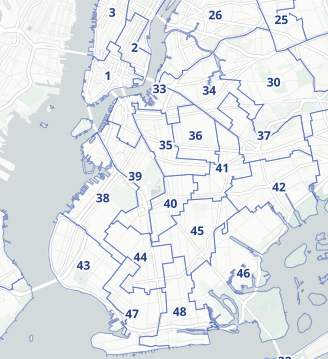
Brooklyn has 16 council districts (use the map here to find your district), but not every one of them is getting written up here. For now, we are skipping races where the vast majority of candidates are fluent in the issues of the livable streets movement. It is unlikely, for example, that term-limited Council Member Brad Lander (D-Park Slope) will be succeeded by someone who sets the city backwards on street safety. Same for the race to succeed Greenpoint Council Member Steve Levin.
At the same time, we would have covered Council Member Justin Brannan's race — if only to push him to do more than just talk a good game — but he is an incumbent running unopposed. And incumbent Alicka Ampry-Samuel, who has been a non-presence on livable streets, is facing a lone challenger who does not appear to be actively campaigning.
So here are the races we are following:
District 34 — Bushwick, Williamsburg (Council Member Antonio Reynoso, term-limited)
Number of reported crashes, January 2019 to date: 6,930 (roughly 10 per day), injuring 426 cyclists (killing two), 373 pedestrians (killing seven) and 1,246 motorists.

Candidate:
- Jennifer Gutierrez, chief of staff to the current council member
Update: Several candidates have joined the race, though all trail far behind Gutierrez in money raised:
- Scott Murphy, healthcare worker and Revel employee
- Terrell Finner, arts administrator
- Andy Marte
Despite a term-limited council member in a politically active Bushwick district with myriad urban problems, only one person is raising any significant money to run for the seat: Jennifer Gutierrez.
She vows to continue Reynoso's approach of saying, as she put it, "I don't give a 'f' about car culture."
"I talk to residents all the time who say, 'Oh, I used to like Antonio, until he put a bike lane on Grand Street' or '...when he talked negatively about cars.' And it's tough, I get that. I know what it's like to look for parking.
"But driving is a privilege that not everyone can afford," she continued. "It's forward-thinking of us to prioritize alternatives over spending millions that only drivers benefit from. So I want to push for safe infrastructure and transit from an equity perspective."
Murphy's website features many bold positions on transportation, including encouraging people to sell cars by giving them discounted transit, and making Citi Bike free.
---
District 35 — Fort Greene (Council Member Laurie Cumbo, term-limited)
Number of reported crashes, January 2019 to date: 5,975 (roughly 8.5 per day), injuring 376 cyclists, 352 pedestrians and 1,403 motorists.
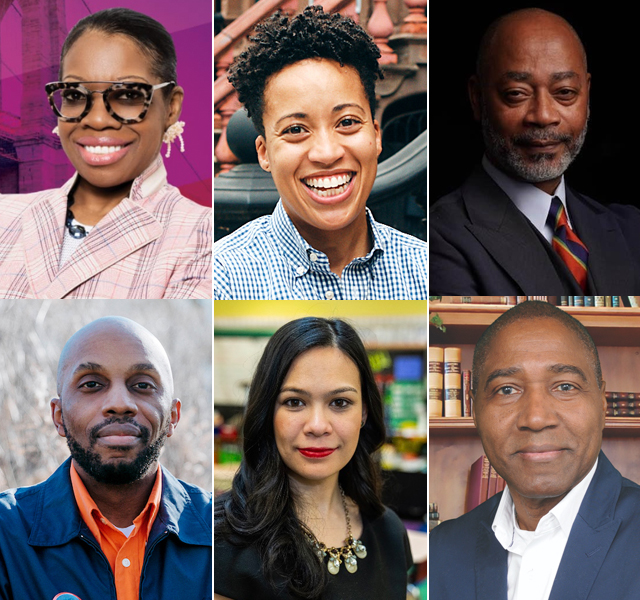
The candidates (listed in order of money raised from most recent filings):
- Crystal Hudson, marketing exec and founder of Greater Prospect Heights Mutual Aid.
- Curtis Harris, accountant (did not respond to multiple requests for comment).
- Hector Robertson, tenant activist.
- Regina Kinsey (no information available).
- Deirdre Levy, teacher.
- Michael Hollingsworth, housing advocate.
- Renee Collymore, longtime community organizer and activist.
Residents of this sprawling district, which spans from DUMBO to southern Crown Heights and comprises areas of great wealth and great poverty, have many good choices if they are focused on street safety issues.
Where the term-limited council member ignored street safety issues and played longtime residents and homeowners against incoming "gentrifiers" against longtime renters, Hudson, Levy, Robertson and Hollingsworth spoke of a different approach.
On issues related to transportation, there was broad agreement, but differences emerged in tone. Hollingsworth advocates for free public transit — and, until that can be accomplished, expanded dedicated bus lanes and, finally, some protected bike lanes for the neighborhood. Cumbo did not advocate for such things because she was unwilling to confront the district's small cohort of car owners, who have opposed (for more than a decade) anything that would remove parking. Hollingsworth said he would educate drivers that better public transit that serves more people is ultimately good for them, too.
"And we need protected bike lanes," added Hollingsworth, who walks for the most part. "I know that the council member created a narrative that bikes are for 'gentrifiers,' but my family has always been on bikes. I believe in folks riding safely. We need physical barriers. We need to move past just paint."
Hudson described herself as a bike rider. And she supports more protected infrastructure. But her foremost concern is making sure everyone in the community is on board with changes. For example, whenever Streetsblog pressed her about whether she would challenge drivers to give up their space so that transit users and cyclists can be better served, she consistently said she would "go back to the community" for a broad discussion.
"You have to meet those people where they are," she said. "The city makes decisions too often without community input. ... I'm a pedestrian, I'm a cyclist, I'm a straphanger, and I'm a driver, so I can take into account each perspective. We have to have conversations that are not combative or coming from negativity. I always talk about bike lanes by talking about the delivery workers. They are trying to make a living. If we can't design smart, safe infrastructure to make it easier for people like that to do their jobs, we have a problem. Car drivers can understand that."
Do they?
"The conversations are always combative; it's always 'the bikers against the drivers,'" she said. "But we don't have to come to it with that anger or resentment. Who is on the roads? Who needs them to be safest? We should be prioritizing the people who are most vulnerable: pedestrians."
She also spoke glowingly of dedicated bus lanes such as the 14th Street busway in Manhattan, and the safety of protected bike lanes, but continually said she would not compel such changes on the neighborhood until after extensive discussion.
"Sometimes people don't have facts and figures or don't take into account who cyclists are — the majority of people on bicycles are Black and brown people and immigrants, so we need to share as much factual information as possible. People are smart and we need to trust that. I trust constituents to make good decisions for themselves, and their families and the broader community if they have the facts."
When reminded that people's individual decisions are not always what's best for the community, she continually said she trusted voters to do the right thing:
"I have faith in people. Government has always withheld information, so it's incumbent on leadership to provide people with as much information as possible," she said. "Everyone is not going to agree on every topic, but having the conversation and starting from a place of being informed lends itself to more fruitful conversations."
Levy, a Tesla driver, also spoke of the need for more bike and bus infrastructure, but was not convincing, saying instead that she favors compromises that work "for all users." She was more concerned with the fuel that cars use vs. their very existence as a detriment to city life. She opposes congestion pricing.
Collymore, who is well known to Streetsblog readers as someone who vehemently fought the city's residential loading zone pilot project, is very supportive of drivers, even saying, "We are Black people and we need our cars." After a long conversation with Streetsblog — which consistently challenged her pro-driving stance — she said, "Please tell the bikers I am not against them! I do support that way of transportation." Does she? You be the judge:
- "Safety is the biggest thing," she said, "but I'm not going to take something away [parking] from a group of people who are just trying to enjoy their lives the best they can."
- "One of the woman who was affected by the loading zones told me, 'If they take away the parking, I'm going to have to sell my house.' Getting around by car is how she gets around. It's not for any of us to tell people how to live."
- "If you live on a block, you should be able to park on the block."
- "We still have a culture in this district of people who don't ride bikes. There is a Black culture here, and driving is still the majority." (Census figures dispute that.)
All of that said, Collymore said she supports creating protected bike lanes and she is very critical of the NYPD's policing of people of color. She would take away the pensions of officers found guilty of misconduct, for example. And she would remove the NYPD from areas for which they have not been trained, such as mental health and social work services.
Hudson and Hollingsworth also support major NYPD reform, including reallocating agency funds.
Robertson would not challenge the status quo on parking. He supports protected bike lanes and dedicated bus lanes, but only on some roadways where they would not affect drivers.
Harris did not respond to Streetsblog's multiple requests for information and an interview. In an interview with Bklyner, he defended parking.
---
District 36 — Bedford-Stuyvesant (Council Member Robert Cornegy, term-limited)
Number of reported crashes, January 2019 to date: 5,237 (roughly 7.5 per day), injuring 303 cyclists, 375 pedestrians and 1,254 motorists.

The candidates (listed in order of money raised from most recent filings):
- Regina Edwards, manager, pharmacy department at Kings County Hospital.
- Tahirah Moore, former Brooklyn Borough Director, Mayor’s Community Affairs Unit; and adviser in the Mayor’s Intergovernmental Affairs Unit
- Chi Osse', activist and co-founder of Warriors in the Garden
- John Joyner, no info found; candidate did not respond to messages.
- Ralph Yozzo, no info found; candidate did not respond to messages.
- Robert Waterman, pastor, educator and community board member.
- Jason Walker, community organizer (just entered the contest)
- Shadoe Tarver, no info found
- Gregory Green, no info found
- Henry Butler, no info found
- Ronald Colter, no info found; candidate did not respond to messages.
It does not appear that many of the candidates to succeed Robert Cornegy to represent Bedford-Stuvesant are actively campaigning; most do not have websites or contact information on the internet or on social media. Only Edwards has raised any real money for the campaign, with two others having raised only three figures and the rest posting no donations at all.
Edwards, Moore, Osse and Waterman all had good things to say about the importance of street safety issues in a neighborhood with nearly seven car crashes a day and not a single protected bike lane. But only Osse is a full-throated supporter of many of the issues that livable streets advocates call for.
For example, Osse specifically said he was angry about the lack of bike lanes and how Citi Bike locations cut out too much of his community. "It's an equity issue," he said, adding that safety infrastructure and bike share is only added to a community once there is "public demand for it — and that only happens because government listens more privileged people move in." He says he no longer rides a bike because he once once hit by a driver and has been scared since.
He also supports less free on-street parking, and said the best way to reduce car ownership is to boost transit. But Osse is mostly running on progressive issues beyond the narrow interests of the street safety community. He is a big supporter of the "defund" the police movement, though he did not use the term.
"I got into the race because we need a culture shift on accountability and power that the NYPD has," he said. "I am for the reallocation of funding for NYPD, especially its military grade weapons," he said, adding that he would have voted "no" on the current city budget because it did not reallocate enough money from the NYPD. He has pledged not to take money from real estate or corporate donors, police unions or fossil fuel interests.
"Brooklyn has been sold out again and again," he said. "I will not be swayed by money."
Moore tried to strike a balance between car owners and cyclists, gently redirecting a suggestion by this reporter that both groups are not equally responsible for global warming, road death, congestion and pollution.
"I do want to decrease the carbon imprint," she said. "But it needs to be better planned. It can't just be my opinion alone, but a collective decision. If there is a big increase in cars and we see upticks in crashes or pollution, that's a conversation that needs to be had. Even if you win an election you can't tell people what to do. I am big on community engagement and needing to hear back from the community."
Waterman was strong on his support for Citi Bike, protected bike lanes and congestion pricing. Where some see a regressive tax, Waterman saw the issue clearly: "Working-class people take transit, and congestion pricing helps those people," he said. "If you're going to be the big baller and drive your car into Manhattan, you have to pay the price."
He does want more parking built in the neighborhood, however.
Edwards is not fully up to speed on transportation issues, but she says she supports efforts to make cycling and walking safer, as well as reduce congestion through residential loading zones.
"There should not be as many crashes and congestion as there is right now," she said. "I am open to the idea of residential loading zones if it is shown to work."
Edwards supports more Citi Bike and more dedicated bus lanes — and as a car-free New Yorker, she is quick to tell you the quality of all the bus routes in her district.
"We should have dedicated space for the buses so they have their own lanes and can keep moving," she said. "Public transportation should be better than driving."
Walker, who entered the contest late, wants to make up for lost time by strongly supporting better transit and safer bike infrastructure. His top priority, he said, was expanding Fair Fares so that more New Yorkers can benefit from reduced transit costs.
He also said he would champion dedicated bus lanes over the parochial needs of drivers, citing the 14th Street busway as a model.
He was a victim of road violence himself when he was struck by a hit-and-run driver as he biked through Bedford-Stuyvesant two years ago. "We need to create a better climate for cycling, and that includes the NYPD not using bikes as weapons," he said. "I get it. Cars are cool. Cars are fun. But our planet is in crisis and I have a planet-first approach."
Unlike other candidates, he dismisses the notion that bike lanes cause gentrification.
"The African-American community has always ridden bikes, but the idea of creating bike lanes for safety only seems to come about because of the safety of White bodies is more important than the safety of Black bodies," he added. "That's where that notion comes from and I can completely understand it. But bike lanes do not lead to gentrification. They may be a product of it, but it doesn’t cause it. We need to see that. We should have created these bike lanes first."
---
District 37 — East New York, Bushwick (Council Member Darma Diaz, who just took office)
Number of reported crashes, January 2019 to date: 7,053 (roughly 10 per day), injuring 258 cyclists, 347 pedestrians and 1,828 motorists.
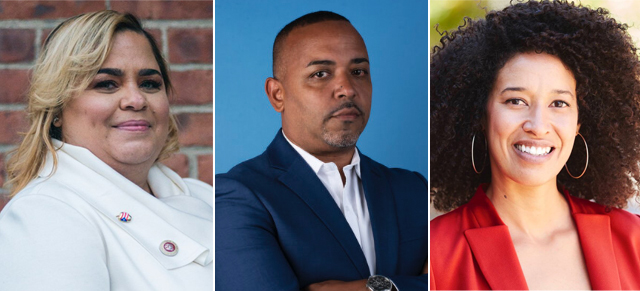
Candidates (listed in order of money raised from most recent filings):
- Sandy Nurse, community organizers, carpenter and founder of BK ROT and co-founder of the Mayday Space.
- Misba Abdin, founder, Bangladeshi American Community Development & Youth Service (could not be reached)
- Darma Diaz, current council member via an uncontested special election
- Rick Echevarria, housing activist
Darma Diaz became council member after all her challengers were knocked off the ballot for the special election after the resignation of Rafael Espinal last year. She is aware of issues such as street safety and the need for sustainable transportation options, but she is not a full-throated advocate. And she is a driver and advocate for more, not less, parking.
She does not believe Census figures that show that 66 percent of households in her district do not have access to a car. She believes the majority of residents of her East New York district drive. "Driving is a personal decision," she said. "To me, a vehicle is a necessity. Yes, I support it [car-reduction strategies], but everyone has a right to choose. Why would I encourage someone to take the J train, with the assaults and the conditions, when they can just drive?"
Fortunately, voters in the 37th District have two candidates (and, perhaps, a third, except Misba Abdin did not respond to our multiple requests for comment) who understand street safety.
As a carpenter, Nurse uses a Ford F-150, which she says she "needs" for her livelihood. But she also understands that "we need to disincentivize the use of cars — and the way to get to that is to invest in better public transit."
But her leadership style would be conciliatory, to the point of giving "the community" a big say. She feels, for example, that Citi Bike was poorly rolled out because residents felt they had no say in where the docks would be located; the many community board meetings about that were not enough, she said, because not everyone in the neighborhood knew about them.
"We can be smarter than that," she said. "We can identify spaces that are more public spaces that are near parks where it has less of an impact on a very residential block. This is not rocket science. It's about placing things in appropriate places. The people who are complaining might be older and they don't bike. so we need to check ourselves. There is a negative reaction to this stuff. It is on us to change that. There are ways to prioritize those conversations. Yes, we can roll out more bike share, but with a better placement."
She also hopes that congestion pricing can be expanded to other "high-density" areas beyond merely Manhattan below 59th Street, but her support for that form of revenue creation was undermined by her concern that speed camera tickets are unfair towards the working poor.
"They make sense in school zones," she said. "I am a big proponent of Vision Zero. We need to reduce pedestrian deaths. We need to ensure that trucks are on the streets they're supposed to be on. But at the end of the day, it's very complicated to be generating income from ticketing. Often, it's the difference between someone paying a food bill or the ticket. If you get booted, you are falling into a poverty trap. We should be considerate of the fact that people make very simple mistakes and the consequences can be severe."
She supports protected bike lanes and dedicated bus lanes, especially when they are built to help the target audience: working cyclists and working-class transit users.
Rick Echevarria's campaign is mostly organized around housing justice. But he called himself "zero tolerance on us not adjusting to our climate reality."
"If you're a senior citizen on the community board and you're advocating for more car use, we will have a problem," he said. "I don't use a car."
He said one issue in neighborhoods like his is that drivers create their own narrative.
"People use bikes. As councilman, I would do widespread education to demistify stereotypes about cyclists. I would push a counter-narrative about why we need more protected bike lanes and Citi Bike to address our climate problems. It goes hand in hand with getting affordable solar panels."
---
District 38 — Sunset Park, Windsor Terrace (Council Member Carlos Menchaca, term-limited)
Number of reported crashes, January 2019 to date: 5,658 (roughly 8 per day), injuring 237 cyclists (killing three), 297 pedestrians (killing four) and 1,112 motorists.
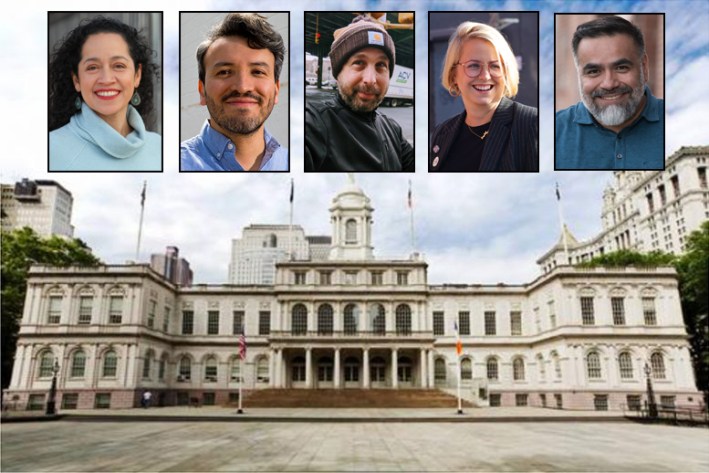
Candidates (listed in order of money raised from most recent filings):
- Alexa Aviles, program director for the Scherman Foundation
- Rodrigo Camarena, immigrant and community advocate
- Cesar Zuñiga, community board chairman
- Erik Frankel, local businessman
- Jacqueline Painter, community organizer
- Yu Lin, could not be reached
The main issue in this Sunset Park/Red Hook/Windsor Terrace district is safety. There are roughly eight crashes a day in the district — this is all too common across the city — but Sunset Park life is defined by road deaths. In 2019, four people were killed on Third Avenue alone — and that trend continued into 2020 with the death of cyclist and nurse Clara Kang in October and Alejandro Santos in late December.
Having a social life in Sunset Park is easy; there's a large vigil for a dead resident practically every month.
Fortunately, all of the candidates we interviewed who hope to succeed term-limited Council Member Carlos Menchaca get it.
Alexa Aviles, Rodrigo Camarena, Cesar Zuñiga and Jacqui Painter all agreed that roads are too unsafe and that the city must make changes immediately. And all spoke about the danger as Sunset Park, which has a very large walk-to-work component, becomes a dumping ground for last-mile delivery warehouses and trucks.
All of the candidates talked about how too much parking only causes congestion that gets in the way of vitally needed transit. All of the candidates favor more protected bike lanes. All of the candidates are appalled at the speedway conditions on Third Avenue. All are passionate about stopping climate change (much of the district would be under water in the worst-case scenario). All of the candidates would better fund the MTA (Painter is advocating for free transit because "public transit is too expensive for working people." Erik Frankel also called for free transit).
So the differences are at the margins. Aviles addressed why there is often pushback from car drivers over the elimination of parking or the installation of bike lanes, saying it's the fault of the city for not properly engaging communities that feel dumped on or are handed "solutions" like the BQX trolley that the never asked for.
Painter and Camarena focused on an approach that would make transit improvements so good that drivers see the benefits clearly (but Camarena said he can see the need to "limit" parking, not eliminate most of it). Zuñiga said he would make sure everyone is at the table so that "people don't retreat into corners."
"When we had meetings about the Fourth Avenue bike lane, I couldn't understand why it was so controversial," he said. "Sure, there will be people unhappy, but we need to be able to be in a room to talk about these things."
Frankel, who just joined the race, does not seem to be a serious candidate, though he has a seriously audacious campaign platform: no matter what question Frankel was asked, the shoe store owner and Sunset Park fixture always brought the conversation back to his dream of tearing down the Gowanus Expressway and burying it in a tunnel.
"I have a small building and I live upstairs," he said. "All the politicians say they want to keep small business in Brooklyn. Well, removing the BQE would be pumping a lifeline. But Sunset Park is bizarro world because the politicians vote against the interest of the community because they don't rents to go up. But if you build a tunnel, you could have Third Avenue be turned into a bike highway. We live in one of the wealthiest countries in the world and it's tragedy that we can't build a tunnel to replace a roadway that's falling apart and is a benefit to everyone except people who live in this community."
In a 20-minute conversation, Frankel also advocated for policies that would increase the likelihood of gentrification, which is a third rail in the district.
---
DISTRICT 39 (PARK SLOPE, CARROLL GARDENS, KENSINGTON) GOT ITS OWN WRITE-UP HERE.
---
District 40 — Flatbush, Crown Heights (Council Member Mathieu Eugene, term-limited)
Number of reported crashes, January 2019 to date: 4,107 (roughly six per day), injuring 218 cyclists, 319 pedestrians and 937 motorists.
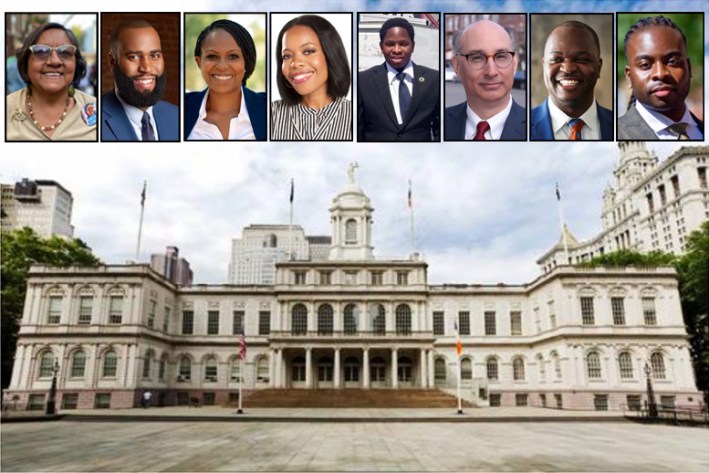
Candidates (listed in order of money raised from most recent filings):
- Edwin Raymond, currently an NYPD lieutenant
- Rita Joseph, public school teacher
- Brian Cunningham, former chief of staff for CM Laurie Cumbo
- Josue Pierre, former Brooklyn Borough Director for Comptroller Scott Stringer
- Blake Morris, lawyer
- Maxie Eugene, the current council member's brother (did not respond to multiple requests from Streetsblog)
- Cecilia Cortez, former teacher and community organizer
- Vivia Morgan, construction company owner (did not respond to multiple requests)
- Kenya Handy-Hilliard, former Brooklyn-Queens-SI director for NYS Attorney General’s Office
- Kenneth Lee, student at Medgar Evers College.
- Harriet Hines, church administrator (could not be reached at all).
Council Member Mathieu Eugene has been in office since taking over from newly elected Rep. Yvette Clarke on April 25, 2007. He is the longest-serving member of the Council — and one of the few elected officials about whom it is very easy to never hear a single positive thing.
Eugene, at best, has been a non-presence in the council and in his neighborhood. The good news is that voters in the 40th District can chose from many candidates who show enthusiasm and commitment for livable streets and safer roadways for all users.
The main issue in the Flatbush/Prospect Lefferts Gardens district is transit and chaotic streets filled with double- and triple-parked cars that slow down buses and undermine commerce. Eugene, by all accounts, did nothing to change that.
All the candidates addressed the dangers, but some were far more forceful on street safety issues. Despite (or perhaps because of) his affiliation with the NYPD, Edwin Raymond does not have a windshield perspective (he is also a cyclist and a renowned police whistleblower, so there's that).
"Police think enforcement is the only thing, but I see the bigger picture," he said, referring to the need to redesign streets and build protected bike lanes and, yes, even remove some street parking for safety. "We will have to eat into some of the parking, but it will accomplish something. And that will help people with cars to understand it. And reducing the amount of space will deter people from getting a car. We need more people to see that mass transit is the way to go."
But on the enforcement side, Raymond referred to a recent Streetsblog article about an officer's refusal to write a failure-to-yield ticket to a driver who had struck a cyclist and said that the driver should have been ticketed in that case.
Another leading candidate, Josue Pierre, is also a cyclist. He also said that neighborhoods like his should reduce parking in order to help buses move faster. He acknowledged that drivers will complain, but dismissed their complaints as the throes of a small minority of people in a working-class community that is desperate for better transit. (Point of information: Pierre is also a cousin of controversial Brooklyn Democratic Party Chairwoman Rodneyse Bichotte.)
"A dedicated bus lane is really good," he said. "It makes it possible for people to get to key places faster, and the majority of people don't have cars. They won't give up their car the day they see the dedicated bus lane, but they may if they once they start using it."
Kenya Handy-Hilliard also supports transit, but comes at it from the perspective of trying to convince drivers of the damage they do.
"It's a culture in central Brooklyn," she said. "We have been a driving community. There needs to be a larger cultural shift. and that is going to take time. But I am willing to have that conversation and get yelled at and screamed at. People will reject what they don't know, and if they used to driving, that's what they're going to do. But if I create an opportunity that driving becomes unnecessary, I will eventually get rid of the car. We want to make cars irrelevant, and to do that, we have to make sure everything we need is here. We have to make cycling safe and improve pedestrian experiences."
She is also a strong supporter of reallocating billions away from the NYPD.
Rita Joseph was keenly focused on the racial bias of the NYPD in regards to policing public space.
"I'm a mom of four black boys," she said. "When they're out, I'm always nervous. My son was driving a car that I had rented and the police pulled him over and had him handcuffs, accusing him of stealing the car. We need to reallocate the NYPD budget and reinvest it. We aren't going to get $1 billion out of the NYPD budget right away, but we can invest in teachers, social workers. As a teacher, there are times when I have 32 kids in a room. I don't care how good a teacher is, you are going to lose some kids. That's why I would have voted 'no' on the budget this year. It didn't cut the police enough."
Brian Cunningham said he was willing to lose the election over protected bike lanes.
"We need them on major thoroughfares," he said. "I know how much death out there, especially on Coney Island Avenue, and no one is taking responsibility for it."
And where many candidates for other seats spoke of "letting the community decide," Cunningham was clear that he was "willing to fall on my sword" on this issue. "Public input doesn't mean the public gets to decide. At some point, you have to make some calls, and this is one of those issues."
Cecilia Cortez also called for cyclists to be safe, and is offended that protected bike lanes mostly end up in well-to-do neighborhoods. But clearly she is not spoiling for a fight. "We have to go to the community and see the community needs," she said. She added that she opposed congestion pricing also because "the community was against it." That said, she says she is a strong supporter of transit.
Blake Morris is pushing for residential parking permits, a dubious proposal that many candidates across the borough often talk about as a way to appease local parkers, but then fail to price high enough to discourage people from actually buying cars now that they are assured of getting a spot. Morris said he would start his residential permit at just $50 a year.
But Morris said he would aggressively reduce parking in commercial areas to allow for deliveries and daylighting of corners.
"There is no culture of transportation in this neighborhood," he said. "There is just chaos."
---
District 42 — Canarsie, Starrett City (Council Member Inez Barron, term-limited)
Number of reported crashes, January 2019 to date: 7,467 (roughly 11 per day), injuring 180 cyclists, 401 pedestrians and 2,586 motorists (and killing two cyclists, eight pedestrians and four motorists).
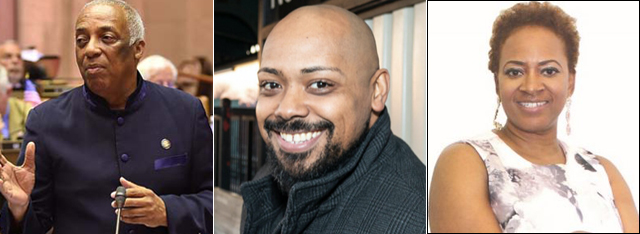
Candidates (listed in order of money raised from most recent filings):
- Nikki Lucas, outreach director at Senior Outreach Service of New York
- Wilfredo Florentino, political and housing activist and theater company founder
- Charles Barron, the former Council Member and current Assembly Member (no website)
- Gena Watson (could not be reached)
Is this even a race? Charles Barron, who was the Council member for this Canarsie and East New York seat from 2001-13 before succeeding his wife, Inez Barron, in the state Assembly (she took over his council seat) is seen as a shoo-in for the seat that most people in the district think he never left. Barron is a force of nature who campaigns against gentrification, against police brutality, against for-profit development, against unaccountable public authorities and against millionaires, whom he thinks should be taxed more
He is not a leader on creating safe streets or on nurturing transportation alternatives, but blamed his voters for that, rather than any personal animosity towards bike lanes and safer road designs.
"I support protected bike lanes, but we don't have them and we are getting around fine," he said. "No one comes into my office, and no one has come into my wife's office, and said, 'We need protected bike lanes!' But, yes, I know that bike lanes are important, if only because it will cut down on pollution, but honesty compels me to say that's not a priority in my community."
Nikki Lucas, who works with seniors in addition to being a local activist, disagrees with Barron on that.
"It's true that different parts of the district have different needs, but it’s important to forward-think the needs and the concerns," she said. "In Starrett City, where I live, people have gotten killed. And I have physically watched police harass kids for riding on sidewalks, which points to the need for a bike lane. You can’t say there’s not a need to put that in place."
Barron agreed on the need for reform of the NYPD, saying residents of the district "are more concerned about racist stop-and-frisks by the NYPD, frankly [than bike lanes]. We face that NYPD racism in parks, on sidewalks, in public space. It's a real problem. The racism in the Police Department means any incident can be an explosion."
It is likely Barron will be elected, but progressives on livable streets issues have one candidate who centers their issues in this election: Wilfredo Florentino.
The local community board member — a fixture at vigils for road violence victims in this crash-prone neighborhood — calls for a different approach by the city.
"We need a Council member who will prioritize street safety in our community," said Florentino, who led his board's transportation committee for several years. "I understand these issues fully. Not centering these issues is literally killing our people. There needs to be community-led street safety plans, and then the city needs to implement it."
Lucas, who is a driver, agreed with much of Florentino's agenda, but did not champion it to the degree that Florentino did. She said she is "open" to creating more dedicated bus lanes in the district, but did not see an immediate need. She did demand more handicapped accessibility at district subway stations, which is long overdue. And she is an advocate for reduced fares on public transit because "folks can't afford it."
"We're penalized for being poor," she said, calling for the MTA to stop criminalizing the merciful act of simply swiping in a fellow subway rider.
---
District 44 — Boro Park (Council Member Kalman Yeger)
Number of reported crashes, January 2019 to date: 4,015 (roughly six per day), injuring 207 cyclists (killing seven!), 332 pedestrians (killing two) and 646 motorists.
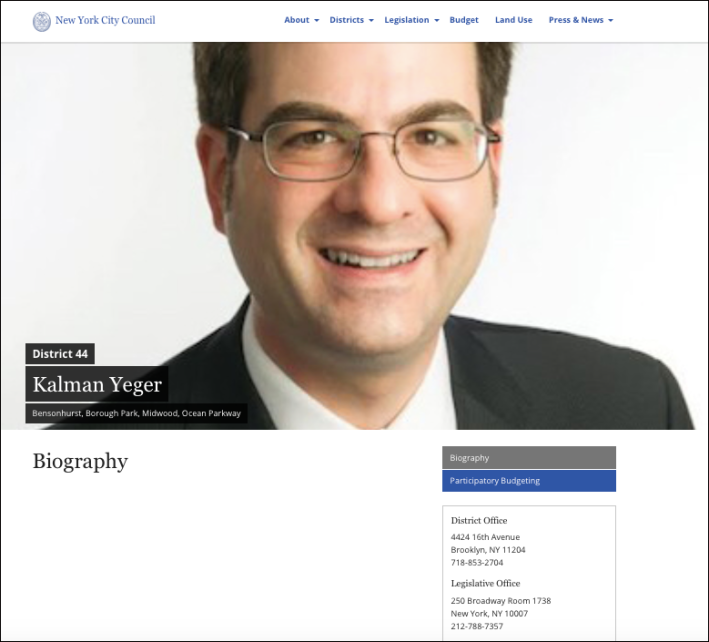
Candidate:
- Kalman Yeger, incumbent council member. Yeger declined repeated requests for interviews.
The 44th Council district is one of the most dangerous places in the world to be a cyclist or a pedestrian — and the incumbent council member, who has done virtually nothing to make the district roadways safer, is running unopposed for re-election. In other words, there will be no way to get rid of Kalman Yeger, who is quite literally the face of road carnage in New York City.
Seven cyclists and two pedestrians have been killed since January, 2019, in his Boro Park district — a period of time when Yeger has opposed virtually all street safety improvements:
- He opposed the expansion of speed cameras, voting "no" with Joe Borelli and Stephen Matteo, two Republicans from Staten Island (themselves frequent violators of speed limits).
- He opposed the "streets master plan" law, which will mandate 30 miles of protected bike lanes and 50 miles of dedicated bus lanes per year.
- He opposed the reorganization of the commercial waste industry so that garbage truck drivers aren't speeding through residential communities late at night.
- He voted against a simple bill that would allow cyclists to follow pedestrian signals at intersections with leading pedestrian intervals — a basic safety measure.
- He voted against a bill that bars city employees from parking in bus lanes and bike lanes (which is already illegal).
- He was even the only member of the 51-person council to vote against a bill allowing the NYPD to tow away cars that are illegally parked in bus or bike lanes, on sidewalks or at fire hydrants.
Almost everything you need to know about Kalman Yeger is evident in his questioning of then-DOT Commissioner Polly Trottenberg at a recent council hearing (jump to 2:06). Despite nearly a dozen deaths and the hundreds of injuries suffered by his constituents during his two-plus years in the Council, Yeger virtually all his time questioning Trottenberg about why the city continues to spend money to bring curb cuts up to federal ADA standards (the answer, which he well knows, is that the city is under orders from the US DOJ to get the work done already — work that Yeger, inexplicably, wants delayed).
“A lot of this is in residential neighborhoods where there isn’t a lot of foot traffic,” he said, demeaning his handicapped constituents in two different ways in the same sentence.
Yeger has never put forward a street-safety improvement, nor publicly supported any bus or bike lane improvement, nor, frankly, said much of anything: His Council website is blank, with not so much as a rote biography, photos or even a press release about anything on it.
He did not return repeated calls and emails for this story.
If Yeger is known for anything, it is for being stripped of his membership on the Council's immigration committee after a Twitter fight with U.S. Rep. Ilhan Omar over his insistence that Palestine is not a place. He is such a non-presence in public that when the Times ran a story about the 2019 controversy, it had to run file art on Yeger ... from 2012.
It is an affront to democracy that Yeger does not even have a challenger.
---
District 45 — Flatbush, East Flatbush, Midwood (Council Member Farah Louis is running for re-election)
Number of reported crashes, January 2019 to date: 5,685 (more than eight per day), injuring 178 cyclists, 398 pedestrians (killing six) and 1,888 motorists.
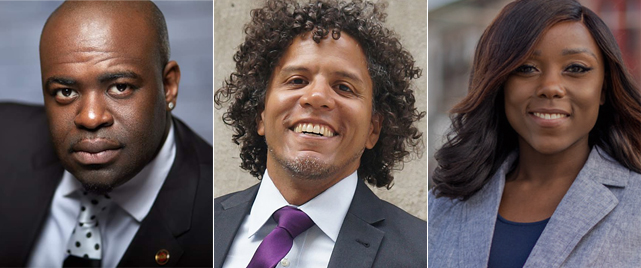
Candidates (listed in order of money raised from most recent filings):
- Anthony Beckford
- Cyril Joseph, no contact information found anywhere
- Louis Cespedes
- Farah Louis, incumbent
Farah Louis has been in this seat since winning the special election to replace ex-Council Member Jumaane Williams after he was elected public advocate in 2019. Since that time, she has not distinguished herself as a leader of street safety or livable streets issues. In an interview with Streetsblog, she was not well versed in the issues.
For instance, she does not see the value of bike lanes because currently, many residents don't use bikes to commute (which is reminiscent of the old joke about how engineers decided not to build a new bridge over a river because no one was driving across the river at that location).
"I do believe in bike lanes, but not for all of my district," said Louis, whose district includes parts of Crown Heights and East Flatbush. "Bike lanes are great for Manhattan and downtown Brooklyn, where they are more reliable for a constituent, but in East Flatbush, where travel [distance] is a lot longer, the benefits are lower. Most people prefer to drive or use a dollar van or Uber. So it depends on who you speak to. Homeowners need their driveways, so putting a bike lane there would be difficult for them."
She also said she supports dedicated bus lanes, except when they remove parking — which is what they do.
Fortunately, two challengers are running on a strong platform of road safety.
Both Anthony Beckford and Louis Cespedes — who are likely to split the sizable anti-Louis vote — complained that Louis is uninterested in important issues such as protected bike lanes, expanding Citi Bike and expanding transit. Neither gets around in a car. Cespedes commutes from East Flatbush to East New York on a bike every day, a trip he said is "very unsafe, but I do it because the bus would take much longer."
Cespedes supports free transit and more dedicated bus lanes, especially if service can be increased "so people stay out of their cars."
"The current council member doesn't consider bike lanes or alternative transportation a priority," he said. "It's a car culture. We have to change the conversation and minds and hearts by explaining to people that in a community as congested as ours, bikes are a reasonable transportation alternative. New people are moving in, and protected bike lanes and space for scooters are in demand. We need a leader who knows what it's like to depend on a bike for transportation."
Beckford said Louis "is not productive in general."
"There is political influence with her," he added. "You have to be like Shirley Chisholm: unbought and unbossed. And that's not the case with her."
Beckford is also critical of the NYPD and a bloated police budget that has "reduced the resources for other things the community needs."
He also was definitive on parking: "We definitely do not need more free parking," he said.
---
District 46 — Flatlands, Marine Park (Council Member Alan Maisel, term-limited)
Number of reported crashes, January 2019 to date: 5,687 (roughly eight per day), injuring 106 cyclists, 276 pedestrians (killing seven!) and 1,875 motorists.
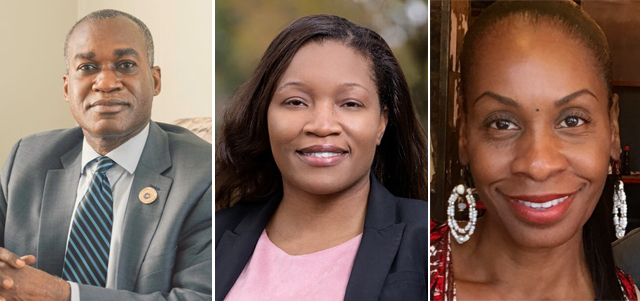
Candidates (listed in order of money raised from most recent filings):
- Gardy Brazela, community board member and head of the precinct community council.
- Mercedes Narcisse, nurse. No contact info available.
- Judy Newton, former NYPD officer. No contact info available
- Shirley Paul, lawyer. Did not respond to emails seeking an interview.
- Dimple Willabus, former president of the District 22 Community Education Council. Did not respond to an interview request.
- Zuri Jackson-Woods, teacher
- Tiffany Tucker-Pryor, deputy director of Community Partnerships at the Manhattan District Attorney’s office
- Donald Cranston, did constituent service for ex-Sen. Marty Golden, a Republican. No contact information found.
The leading candidate to replace Alan Maisel is community board member and precinct community council leader Gardy Brazela. This is sad news for people who care about safer streets for several reasons.
First, Brazela opposes protected bike lanes.
"I'm against bike lanes," he told Streetsblog. "In Canarsie, you have people who have two, three, four cars. If you take away a lane on a roadway for a bike lane, where are people going to park? I am not in favor of bike lanes. In my district, I don't think we need it."
He said he drives from the Canarsie district every day into Manhattan. As such, he opposes congestion pricing on the grounds that it is a tax "on the middle class." When told that Census figures show that people who commute by car into Manhattan from his district make, on average, $12,000 more per year than their transit-using neighbors, Brazela merely said, "Interesting."
He is also troubling to street safety advocates because of his cozy relationship with the NYPD. At one point in the interview, Brazela claimed that the 69th Precinct is a "unique precinct that does not have the kind of problems other communities have." (He should talk to Assembly Member Charles Barron, whose district overlaps the council district. Barron believes otherwise.)
One of Brazil's challengers, Tiffany Tucker-Pryor, is also opposed to bike lanes, proudly boasting that she's been driving since she was 14.
"Bus and bike lanes create more traffic," she said. She also said she opposed congestion pricing because fares should cover all of the MTA's expenses.
There is only one candidate who at least understands the basics of street safety: Zuri Jackson-Woods. She critical of the police, a supporter of congestion pricing as a way of funding transit, a supporter of dedicated bus lanes, and a believer that the future of this city depends on transportation alternatives.
"It's our responsibility as a city to make it easier for folks to live without cars," she said. "The way it's set up, it's difficult to get around on a bike. We can curb emissions from transportation by redesigning our streets to make it safer and more convenient to bike. I'm very passionate about this. There are protected bike lanes in other neighborhoods, so we should have them, too. There needs to be equity."
---
District 47 — Coney Island, Bensonhurst (Council Member Mark Treyger, term-limited)
Number of reported crashes, January 2019 to date: 4,312 (more than six per day), injuring 154 cyclists, 293 pedestrians (killing six) and 903 motorists.
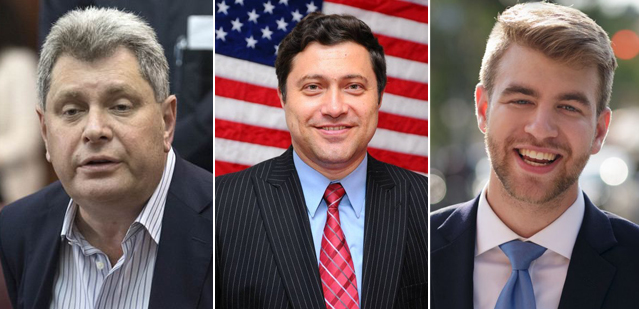
Candidates:
- Steven Patzer, development for Simon Wiesenthal Center, neighborhood activist
- Joe Packer, no information available
- Alec Brook-Krasny, former Assembly member, no campaign information available.
- Ari Kagan, staffer for current council member, no campaign information available.
Welcome to southern Brooklyn — where corruption is very much a part of day-to-day life, and heavy-hitting pols think they can just waltz to office without talking to the press or voters or even setting up a basic campaign website to articulate a position.
Some or all of the above sentence apply to three of the four candidates to replace Council Member Mark Treyger to represent this Bensonhurst-Coney Island district. Alec Brook-Krasny disappeared for a little while after the former Assembly member was arrested for his alleged role in a $6.3-million illegal narcotics scheme in 2017, though he was eventually acquitted. His time in office was marked by almost complete lack of communication with the press.
Ari Kagan, a district leader, has run unsuccessfully for office many times, but recently landed a job as a Treyger staffer, suggesting that he has the council member's support. But he has no campaign website and could not be reached. He most recently showed up in the press for producing more proxy votes from his district at a Brooklyn Democratic Party meeting than he could possibly have had, the Brooklyn Paper reported.
Fortunately, the only candidate who seems to be actively campaigning, Steven Patzer, has a lot to offer street-safety advocates, which is rare in this part of Brooklyn.
Patzer's campaign website talks about the need for more parking; he clarified that position to say that he's advocating for more parking on wider streets by implementing space-saving reverse-angle parking and to improve the existing parking lot at MCU Park, the baseball stadium in Coney Island. Beyond that, he is an enlightened voice on livable streets issues. For instance,
- Patzer supports more dedicated bus lanes (though later, his campaign added, "where it makes sense"): "There is a rumor about Surf Avenue getting a dedicated bus lane. It would be terrific."
- He hates placard abuse: "I really want to crack down on placard abuse. It's out of control. It's bad in my district." Patzer said he recently noticed a "No standing sign" that mysteriously went up in front of a local engine company — resulting in more parking for the firefighters. He told Streetsblog about it, and we called the DOT. The sign was removed two days later. "People are just making their own parking in this district," he said.
- He favors diversifying the transportation modes of his district: "My first stop when I was writing up my transportation platform was to Transportation Alternatives. We need Citi Bike in this district, e-buses, and open streets. Open streets were beautiful, but we didn't get any of them in this district. People here are skeptical of everything, but I will be a council member who will get this stuff done."
- He wants to provide more protections on the roadway for the most vulnerable! "I look to north Brooklyn and Manhattan for inspiration to see what works. Curb extensions are very under-rated. I would build them everywhere. And those plastic bollards to separate traffic. Concerned parents can get together and do that, so DOT should be able to, too. After someone dies, the DOT tells us they want to spend 36 months to study the area. There is nothing to study. Why does it always have to be that someone gets killed? We can get ahead of it."
- He knows that parking is a bad thing, though to what extent is unclear. Initially, he told Streetsblog that "More parking makes more problems. People who care to read about this know that the solution to parking is not making more parking." But his campaign later sought to amend the quote to weaken it: "More parking without proper planning to include the needs of public transit commuters and pedestrians is a bad thing. All southern Brooklyners need to be part of transportation discussions.”
---
District 48 — Sheepshead Bay, Midwood (Council Member Chaim Deutsch, term-limited)
Number of reported crashes, January 2019 to date: 4,763 (nearly seven per day), injuring 163 cyclists, 399 pedestrians (killing five!) and 965 motorists.
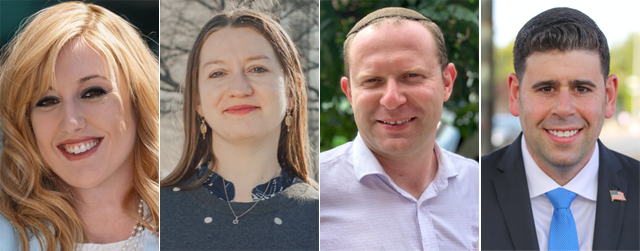
Candidates:
- Steven Saperstein, co-founder of the Shorefront Coalition
- Amber Adler, education and anti-poverty activist
- Boris Noble, former housing policy analyst for the Brooklyn Borough President's office
- Inna Vernikov, no campaign contact info available
- Harold (Heshy) Tischier, radio personality, no campaign contact info available.
- Mariya Markh, former mayor's office staffer, just entered the race.
It is exceptionally rare in this Midwood-to-Coney Island district to have candidates who are well-versed on issues of street safety. The retiring Council member, Chaim Deutsch, was an affable figure, but one who opposed basic street improvements such as protected bike lanes, dedicated bus lanes and reduced speed limits. His pride and joy was creating more parking.
To succeed him, voters have several enlightened candidates, most notably Markh, who just entered the race in the new year and has some catching up to do, fundraising-wise.
Most importantly, Markh is a cyclist who says her district needs more protected bike lanes because without them, bike riders are simply not safe and, as a result, are less likely to ride. In fact, she met her husband, a cyclist, because she once disagreed with him about the need for a bike lane on Emmons Avenue — only to be converted to an advocate once they got to know each other.
She is also a supporter of dedicated bus lanes, even if they result in a loss of parking — a strong flip from the current Council member.
"If we have better transportation options, fewer people will rely on cars," she said. "I have seen first-hand how bus lanes can improve transit."
And she supports congestion pricing, which is certainly not a given among southern Brooklyn office-seekers.
But all of that said, it is unclear how aggressive Markh would be in her advocacy. When she spoke to Streetsblog on Jan. 5, there was no mention of transportation issues on her campaign website at all. When discussing the need for more bike lanes and Citi Bike, it was unclear whether she would be willing to fully take on entrenched car interests in the district.
She did address a vague comment about the NYPD on her website, namely that she "will work with cops, not against them," explaining that she meant that she wants to restore community trust in the police — and would do that by removing the NYPD from some of its many responsibilities, such as mental health services.
And she would decriminalize "jaywalking" to remove the NYPD's perceived racial bias in handing out such tickets, as reported exhaustively by Streetsblog.
Steven Saperstein, is a former Republican now running as a Democrat. He does not fully break with Deutsch over parking, but promised a "rational" approach to governing. "I have no blanket policy for or against bike lanes or dedicated bus lanes," he said. "If the pros clearly outweigh the cons, I am for it. I want to keep people safe, but I am also accountable to the people in my district, so I want to listen to them, but also the experts."
He also vowed to crack down on reckless drivers, even advocating for the city's Dangerous Vehicle Abatement Act to be tightened up so that a driver would not need 15 camera-issued speeding tickets before being held accountable.
Meanwhile, Amber Adler was the victim of a car crash (she was in her own vehicle, which was hit by another driver), so she understands the danger of the automobile. In a conversation with Streetsblog, she empathized with people yearning for safer streets and more alternative forms of transportation, but she lacked the vision to actually see that future world.
She said she would support some bike lane or bus lane proposals, but clearly is not a leading voice for such measures.
Boris Noble, who moved to America from Ukraine when he was 4, strongly supports more funding for transit, though he is a skeptic about how well the MTA manages the system. He says he supports bike lanes and dedicated bus lanes, and described himself as livid about city officials, and others, who park in that protected space.
"So my issue is, how do I go back to my community and tell them I'm going to remove parking for a bike lane, when the bike lane just becomes a parking lane for someone with a placard?" he said. "We must fight placard abuse, yes, but it's not happening, so I'm hesitant to remove parking. I'm not saying no, but I'm hesitant because that spot will become privileged parking, which will only anger the cyclists and the drivers."
He made a similar argument about expanding transit. "If the bus will really only take 50 minutes to get residents to Manhattan, I can make an argument to people that we need it to get people out of cars," he said.
Streetsblog will continue to follow developments in all of the races above during the campaign. The primary election — tantamount to victory in most districts — is on Tuesday, June 22, 2021. For more information, visit the city Board of Elections website at vote.nyc.
Gersh Kuntzman is editor in chief of Streetsblog NYC and Streetsblog USA. He also writes the Cycle of Rage column, which is archived here.
Stay in touch
Sign up for our free newsletter
More from Streetsblog New York City
Adams Backs Lower Speed Limits, Calls Crashes ‘Accidents’
The mayor wants New York City drivers to "slow down," but it's not clear yet how many streets will get lower speed limits.
Wednesday’s Headlines: Trump Posts About Congestion Pricing Edition
Donald Trump comments on congestion pricing — no surprise, he's against it. Plus more news.
DOT Aims to Build First Ave. Tunnel Bike Lane Before September’s UN General Assembly
DOT hopes to have the concrete-protect tunnel bike lane installed this summer, but its exact plans are still in development.
Waste Reforms Could Require Data on Crashes, Dangerous Driving
The proposal affects at least one trucking company with a deadly driving record.
When it Comes to Federal Infrastructure Grants, Size Does Matter
Cities and municipalities with larger budgets and staff are more likely to win competitive federal infrastructure grants, the Urban Institute has found.
